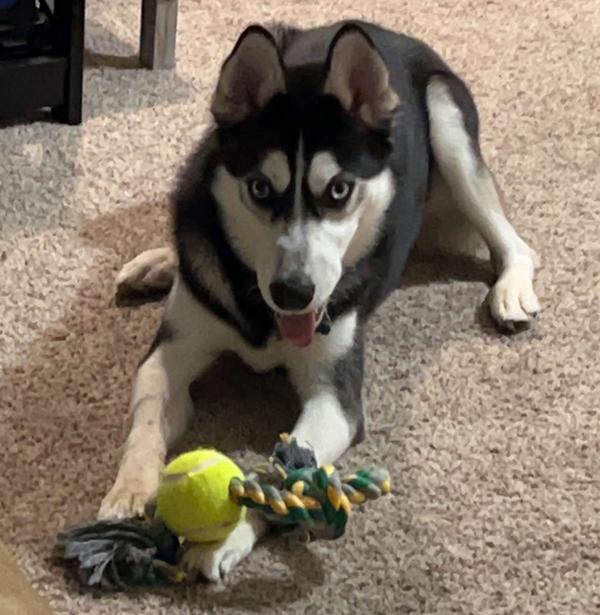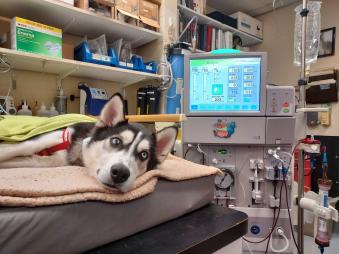-
About
- Leadership & Faculty
- News & Events
-
Admissions
-
Academics
- Graduate
- Advanced Clinical Training
- Continuing Education
- Academic Departments
- Academic Offices
- Simulation Experiences
-
Student Life
- Offices
-
Research
-
- Transformative Research
- Centers & Shared Resources
-
-
Hospitals & Clinics
- Emergency Care
- Hospital Services
-
Community Outreach
- Volunteer
New Dialysis Modality Saves Dog from Accidental Overdose
Husky puppy “Pumba” saved by timely hemoperfusion treatment

He reacted quickly. After discovering his 10-month-old husky, Pumba, had accidentally eaten a bottle of 200mg Ibuprofen pills (possibly 200 of them), owner Ryan Steeves-Kilgallon knew he needed help.
“I brought him to Tufts VETS [Veterinary Emergency & Treatment Services] in Walpole and made a call to the ASPCA Animal Poison Control,” he says. “I received great care from both.” However, to have a chance at saving his life, Pumba needed a special type of dialysis treatment available at the Henry and Lois Foster Hospital for Small Animals at Cummings School of Veterinary Medicine.
“I was crying on the ride to Grafton while trying to keep his head up because he stopped breathing for about a minute,” Steeves-Kilgallon recalls. “He couldn’t stand up when we arrived, but he was treated right away.”
Because he was first seen at Tufts VETS, its staff had called ahead to Foster Hospital, where they were prepared for his arrival. “The minute he arrived, we put a catheter in and started treatment,” says Emmanuelle Butty, D.V.M., DACVIM (SAIM), Clinical Fellow in Nephrology/Urology and a veterinary internist at Foster Hospital.
“Pumba had consumed a fatal dosage of pills. He was stuporous and starting to lose his gag reflex,” says Lauren Carvalho, D.V.M., a senior resident in Internal Medicine who was primarily involved with Pumba’s treatment.
Veterinary Technician Carolyn Tai oversees Cummings School’s dialysis center and started Pumba on a hemoperfusion treatment.
“Hemoperfusion is a new dialysis modality we offer, which uses carbon filters or a synthetic resin that quickly allows the processing of blood through these filters to remove toxins,” Labato explains. “Ibuprofen toxicity is one of our most frequent treatments. Dogs think they are M&Ms and they will eat entire bottles of them.”
According to Mary Labato, V83, the Anne Engen and Belle Professor in Clinical Nephrology and a veterinary internist at Foster Hospital, Foster is among the few centers to offer all five dialysis modalities and Cummings will soon be the only veterinary school in the country to have a new dialysis machine called a CarpeDiem to treat small animals such as ferrets, rabbits, small dogs and cats.
Once the hemoperfusion treatment began, Pumba steadily recovered. “Twenty minutes into the session, his gag reflex had returned and he was lifting his head," says Labato. "At 40 minutes, he was sitting up and eating treats. After the 80-minute session Pumba was taken off the machine and he walked out to say hi to his owner. We saved his life with this treatment.” Pumba stayed another couple of days so he could be kept well hydrated and monitored.
“They told me that if I had waited any longer, he probably wouldn’t have made it,” Steeves-Kilgallon reveals, explaining that Pumba has recovered well. “He hasn’t missed a beat since that incident. I’m so thankful for the care I received so that Pumba is still with me.”
Department:
Foster Hospital for Small Animals
